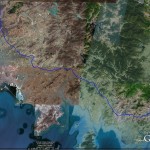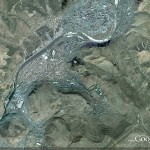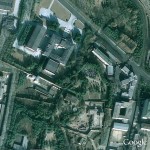
Pictured above (Google Earth): locations of the reported protests in North Pyongan along the Beijing-Pyongyang railway line (blue)
This week several stories came out alleging multiple protests in North Pyongan Province (평안북도) over economic conditions. The cities affected were Sinuiju (신의주), Ryongchon (Yongchon 룡천), Sonchon (선천), and Jongju (정주).
According to the Choson Ilbo:
Small pockets of unrest are appearing in North Korea as the repressive regime staggers under international sanctions and the fallout from a botched currency reform, sources say. On Feb. 14, two days before leader Kim Jong-il’s birthday, scores of people in Jongju, Yongchon and Sonchon in North Pyongan Province caused a commotion, shouting, “Give us fire [electricity] and rice! ”
A North Korean source said people fashioned makeshift megaphones out of newspapers and shouted, “We can’t live! Give us fire! Give us rice!” “At first, there were only one or two people, but as time went by more and more came out of their houses and joined in the shouting,” the source added.
The State Security Department investigated this incident but failed to identify the people who started the commotion when they met with a wall of silence.
“When such an incident took place in the past, people used to report their neighbors to the security forces, but now they’re covering for each other,” the source said.
The commotion started because the North Korean regime had diverted sparse electricity from the Jongju and Yongchon area to Pyongyang to light up the night there to mark Kim’s birthday on Feb. 16.
“Discontent erupted because the regime cut off electricity that had been supplied to them only a few hours a day, and they had hard time putting food on the table due to soaring rice prices.”
A North Korean defector said the Jongju and Yongchon area “has long been a headache to the regime due to the spirit of defiance of the people there.”
In a separate story reported by the Choson Ilbo, it appears that a protest in Sinuiju was launched several days later by market traders who were being harassed by officials.
(UPDATE) The Daily NK reports that the skirmishes were fairly minor:
A news report about a protest supposedly involving a few hundred citizens in Sinuiju on the 18th, released by a South Korean newspaper on the 23rd, appears to have been highly exaggerated. It was just an argument over stall fees between traders and market managers, sources say.
The commotion revealed by a domestic South Korean newspaper occurred at Chinseon Market near Sinuiju Stadium, where a number of fabric and shoe factories are located. The disagreement was triggered by a notice stating that fees would double from 4,000 to 8,000 won a month, or 400 won a day. At current prices, the new stall fee is enough to buy corn to feed a North Korean adult for more than two weeks.
When a member of market management insisted that traders had to follow the regulations unconditionally as an order handed down by the municipal commercial management office, some got so angry that they threw trash at the manager, shouting that it was too much to take and asserting that illegal grasshopper trading, meaning without a permanent stall in the legal market, trading in nearby alleyways illegally while avoiding the eyes of community watch guards or People’s Safety Ministry agents, would be better for them.
Eventually, ten or so agents from a PSM strike force were able to calm them down. Nevertheless, during the incident other traders came along to watch the commotion, so in the end over a hundred of people were gathered in the one area.
After around 30 minutes of complaint, the traders were finally dispersed. Some got hurt during fights with market managers, but there were no serious casualties. Additionally, there was no military presence.
The source explained, “Since market managers are not members of law enforcement, traders were able to grab them irately by the collar and shout at them for raising the fees.”
“Commotions like this are common,” he went on, “so there is no serious uneasiness about it,” and went on, “in addition; community watch guards kicking grasshoppers out of alley markets, then them going back there and trading again is a daily routine. Therefore, physical fights are really common between traders, community watch guards and market managers.”
Finally, he noted, “In Shinuiju, it is generally calm,” and, regarding another report on cell phone usage which suggested that phones had been cut to avoid giving the people access to information on Middle East protests, said, “There is no evidence of that. People are still using cell phones.”
So don’t get your hopes up that this has anything to do with the situation in the Middle East (as some journalists seem to have done). According to Yonhap:
South Korea has not detected any signs of organized resistance in North Korea, although it believes that small-scale protests have sometimes occurred in the impoverished communist nation over economic woes, an official here said Thursday.
Some recent media reports, citing unidentified sources inside the North or defectors, have said North Koreans staged rare public demonstrations over food shortages, amid popular uprisings sweeping the Middle East and North Africa.
“Although small-scale protests over livelihood have been reported since a botched currency reform, we have not observed any circumstances to be viewed as a collective demonstration there,” said the official at the Unification Ministry in charge of relations with North Korea.
Responding to questions about whether the wave of pro-democracy upheavals in Egypt, Tunisia, Bahrain, Libya and elsewhere would affect North Korea, the official said, “I think there would be no big impact in the short term.”
The New York Times also noted the difficulties of mounting social change in the DPRK:
“The gap between the elite and the rest of the country has probably never been wider,” said Mr. Everard, currently a fellow at the Shorenstein Asia-Pacific Research Center at Stanford. But at the same time, he added, “There’s no reason to expect things to change any time soon.”
The Communist regime in Pyongyang, analysts said, has no intention of relaxing its political grip or opening up its economy.
“Reforms mean death,” said Andrei Lankov, a North Korea expert and professor at Kookmin University in Seoul. “It’s a matter of survival and control.
“The leadership wouldn’t mind economic development,” he said. “Look, they’re rational. They want modernity. They’re not fundamentalists looking to Paradise and expecting 72 virgins to be waiting for them.
“But reforms? No.”
Indeed, the word “reform” — kaehyuk in Korean — has never been used in the official North Korean economic literature, according to Changyong Choi, a research fellow in social science at Syracuse University in New York State who has studied the topic. Instead, policy changes are known as “adjustments,” and the result is called “pragmatic socialism.”
Recent refugees, scholars of North Korea and South Korean government officials see no signs that the economic hardships are pointing toward political instability. They see no existential threat to Kim Jong-il and his regime, whether through civil unrest, political factionalism or a military revolt.
Regime change, as tantalizing as it might be to Seoul and Washington, seems remote. Mr. Kim looks to be in passably good health. And the apprenticeship of his youngest son, Kim Jong-un, appears to be under way, albeit slowly and quietly.
Ordinary North Koreans certainly struggle to eke out a living, but they are not starving. And the situation is nothing at all like the so-called Arduous March famine of the mid-1990s. More than a million North Koreans reportedly died from starvation then when aid from Russia stopped, crops failed and the socialist system of food allotments fell apart.
Even at that level of hunger and horror, there was no profound, collective unrest. “The people who kept waiting for their government rations to come, they just died quietly,” said John S. Park, director of the Korea Working Group at the U.S. Institute of Peace in Washington.
The New York Times has more here.
Andray Abrahamian has more in 38 North.



